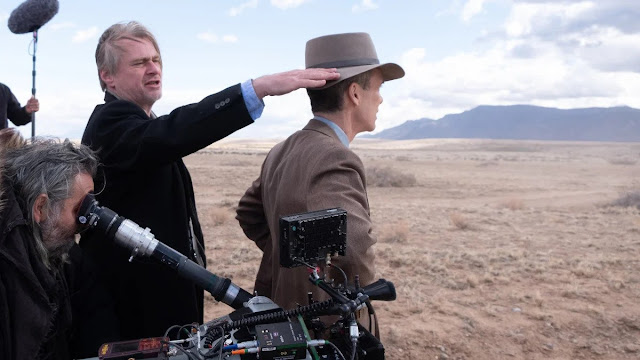OPPENHEIMER
Yes. Of course I am. Even before the film, in the hours leading up to the evening of July 21st, I found myself near giddy at the three hours yet to come – and then, I watched it. Long story short, I don’t regret prioritizing this over Barbie (at least, not yet).
In an opening weekend that will in years to come be spoken about like a cultural pilgrimage, Oppenheimer is debuting alongside Greta Gerwig’s subversive, mega-pink beacon of hope. It therefore seems a little wasteful to label THIS film as maximalist. Maybe, it’s more appropriate to deem it truly Nolan, Nolan-esque, the most Nolan. That’s exactly what it is, as from the crescendo-filled sound mix right down to the treatment of concrete bunkers it couldn’t BE more recognizably his, but so deep into his cinema what exactly does it mean to be a Christopher Nolan film?

(source: Universal)
It seems that
is a question which director has been investigating in this latest stage of his
career. In Tenet, Nolan seemed to be
in conversation with critics of his apparently under-nourished grasp of love by
centering on a married couple who passionately hated each other. The threads
condensed to the surface in that 007-adjacent mindf*ck are present once again,
but more than anything else this time out there seems to be a spot of
sparrowing going on.
Sparrowing is a term that I have recently been trying to get over, which refers to the scene in The French Dispatch where Adrien Brody challenges Benicio del Toro to draw a sparrow, to see if his stylistic flair masks a lack of artistic basics. That’s relevant here because it seems like he who brought us men-of-bats and sci-fi supreme has consciously decided to fixate on a straight biopic. Mixed in with a legal drama. Married by his latest flirtations with time. Listen, he can’t help himself – this is where the style bears out. Candidly, however, it’s almost as if this century’s most famous film-maker is looking at us and saying “yes – I CAN do straight genre, I CAN do the basics,” and who are we to argue as he thrives; “but I will do so on my own terms”.
That’s exactly the philosophy of J. Robert Oppenheimer, doggedly doing things by his own means, always well aware of his position in the room, in the world, and in history. Much is made in-film of the fact that the already-celebrated physicist is, despite his suitors’ misgivings, the only one who can mount this experiment, and that he “sees the world in a different way”, before eventually becoming “the most famous person on the planet”. As conduit for the story, our lead embodies these traits of character and director both – and my, how Cillian Murphy realizes it.

(source: Universal)
Finally
trusted with leading a picture for his close friend, his performance matches
the film in being Nolan’s richest and most complex yet – even up against the
fine company of Guy Pearce in Memento or
Al Pacino in Insomnia. Though we as a
contemporary audience know all about the guilt and conflict of this
protagonist, it doesn’t change that it’s something this film had to focus upon.
As a man at odds as to whether he should be remembered for his legacy, achievements,
or morality Oppenheimer is the archetype for “just because you can… should you?”,
and it’s this inner turmoil that Murphy exceeds in rendering in his director’s
interpretation of real time.
This is a review centered around an enormously positive response, but it doesn’t mean that Oppenheimer is safe from fault. There are the critics’ greatest hits out on show once again: the sound mix is combative, the dialogue difficult to decipher, the emotion is cold. But personally, I found an obvious fulcrum in the film around the nuclear detonation, which arrives not exactly where you might expect it to. After that set-piece the film refocuses itself for a much stronger final hour of bitter, blistering ‘courtroom’ scenes, with delivery reminiscent of David Mamet. However, before then there are stretches where listening to men in tweed suits talk about science and geopolitics becomes a little less dynamic. I also have to unfortunately admit that the film was not the life-changing event I yearned for it to be, nor either was the very scene destined to be remembered as “The Blast”: promised for so long to be both soul- and eardrum-shattering in equal measure, there was probably way too much expectation placed on that fateful countdown.
Not to say that that very moment isn’t sensational, however. It would be too easy to make this review all about the technical grace of Nolan and his co-conspirators; to wax on about the physical delivery of the explosion, or the immersion of Hoyte van Hoytema’s cinematography, or the 75mm photography, or the work of the practical effects team, or… but no, the real magic of this film lies in the cast occupying the space behind Murphy, who take on the mantle of “supporting” with some determination.
At one point it seemed every actor in Hollywood was attached to either this project or the upcoming Dune: Part Two – though if you’re one Pugh, Florence then apparently you do both. Here she gives her entire body to quiet those debates about her director’s grasp of feeling, and if Denis Villeneuve produces a better blockbuster performance from her then we may be in for something truly timeless. It’s difficult to quickly pick out the other main standouts but there might be a core trinity, the first being a reassuringly-game Robert Downey Jr. taking on a Peter Fonda or Tom Hanks sized role. Then, there’s Tom Conti, utterly charming in every single second that he inhabits the form of Albert Einstein. Yet, it may just be Emily Blunt’s powerful and sneakily physical performance as Kitty Oppenheimer that is this film’s Best Supporting character.

(source: Universal)
It is my usual
reaction upon enjoying a film to overstate my enthusiasm, to loudly proclaim its
virtues, romances, and place in my heart. Sometime after I return myself to
Earth, upon which I readjust the film’s position in our great canon. Something
entirely different happened after Oppenheimer,
maybe because I’m older and more instinctively cautious: I sat, recognizing it
was good, but wondering just how good.
Many hours of thought followed, about this tightrope walk between morality and
necessity, life and death, joy and pain, victory and defeat. It’s big, it’s
loud; it’s complicated, it’s star-studded; it’s good… it’s excellent. I am sure
that this is the cinema for which we have been begging – but just to be safe, I’ll
be back multiple times to find out.
https://boxd.it/4zhKBN




Comments
Post a Comment